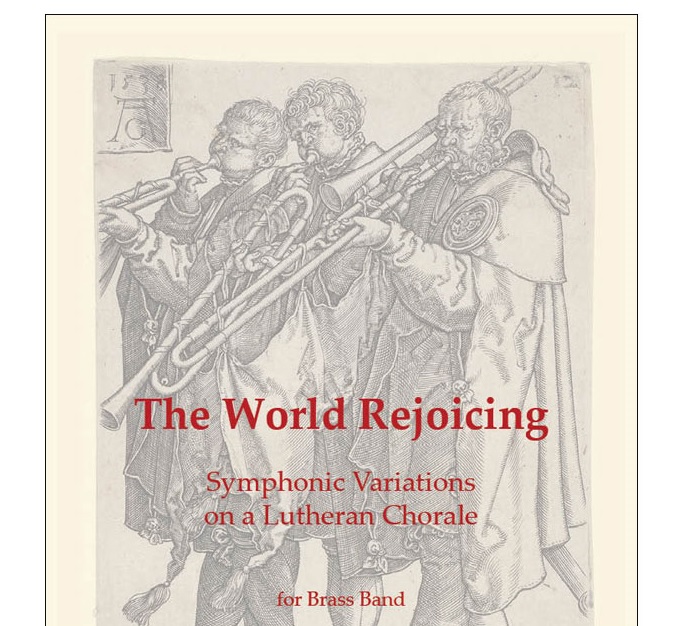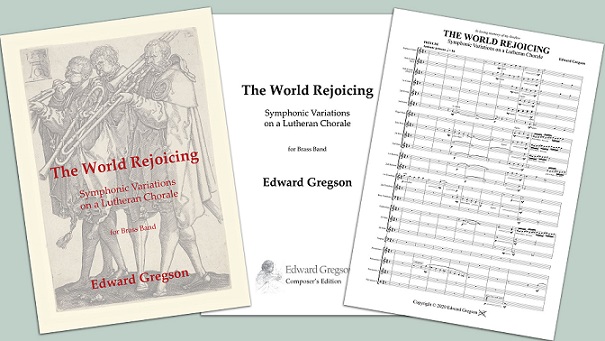
Finally...
Almost two years to the day after it was due to receive its world premiere at the British Open Championship, ‘The World Rejoicing - Symphonic Variations on a Lutheran Chorale’ will finally be performed at Symphony Hall.
Never has its sense of musical optimism ever been more needed.
Global let alone brass banding circumstances have changed hugely since late 2019 when the joint commission was announced alongside future national championship premieres in The Netherlands, Belgium, Switzerland and Norway.
Then, Edward Gregson’s work was very much a bold assertion of a celebration of pan-European hopefulness and communality.
Now, just when we thought we had ridden out the final ripples of the Covid-19 pandemic that caused the initial cancellation of what was to have been the first of those European-wide series of contest performances, we have again been plunged into a crisis of collective consequence.
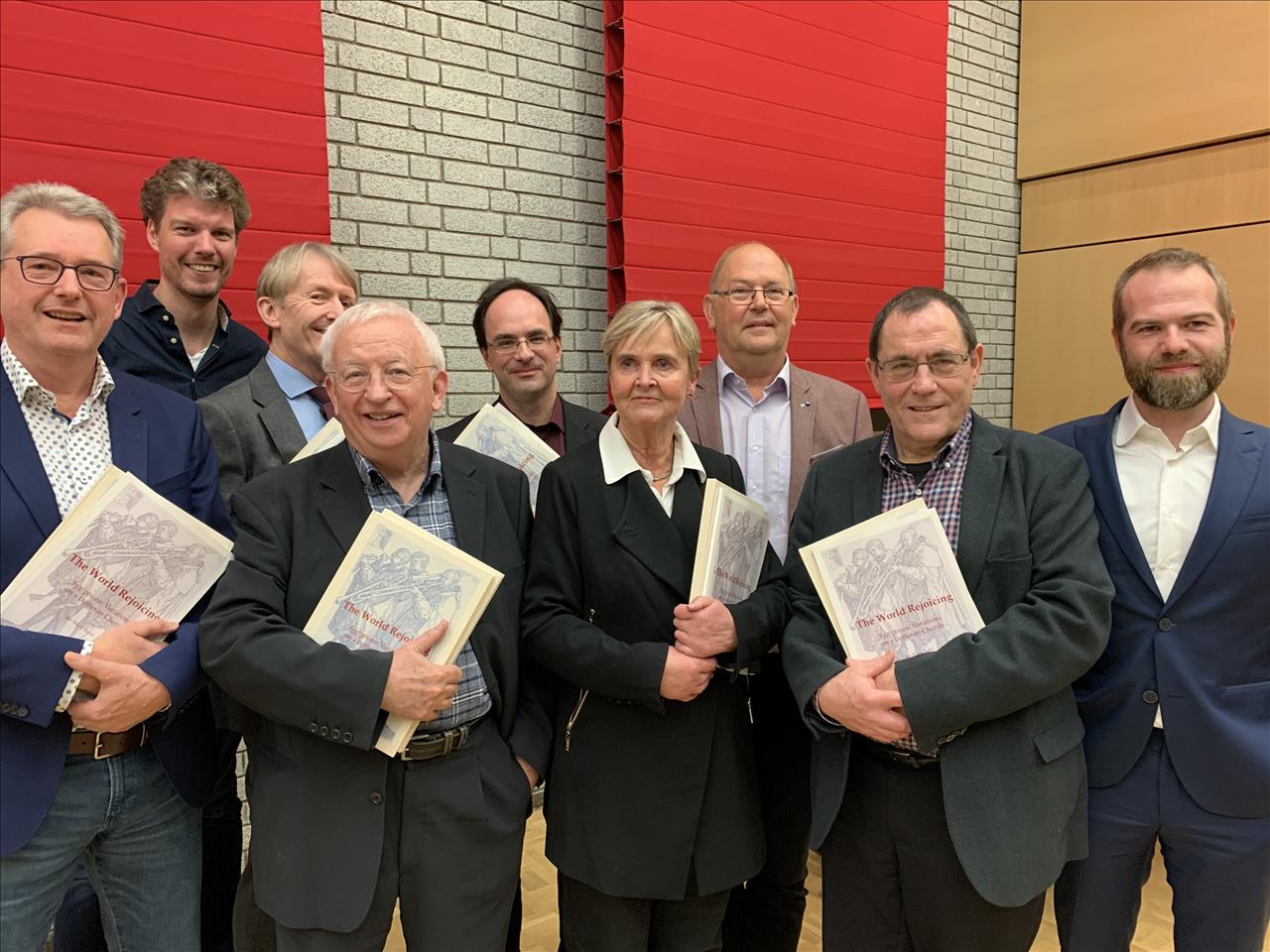
So long ago...
Electricity meter
Given the impending stratospheric increase in energy prices, we can only hope someone will put an extra few bob in the back stage electricity meter at Symphony Hall on Saturday morning - otherwise, to paraphrase Sir Edward Grey, future performances may be at risk of being be cancelled as the lamps go out all over Europe.
As a result, it is now a work instilled with a deeper sense of individual questioning. Opinions on whether we have reason to ‘rejoice’ are much more subjective.
As a result, it is now a work instilled with a deeper sense of individual questioning. Opinions on whether we have reason to ‘rejoice’ are much more subjective.
Wider context
In this wider context, the Lutheran chorale ‘Nun danket alle Gott’ (Now thank we all our God) on which ‘The World Rejoicing’ is based, can embrace a very different arc of metaphorical understanding.
This then is music inspired by the past, entwined by the present and welded to the future.
It certainly gives extra resonance to the British Open contest.
This then is music inspired by the past, entwined by the present and welded to the future.
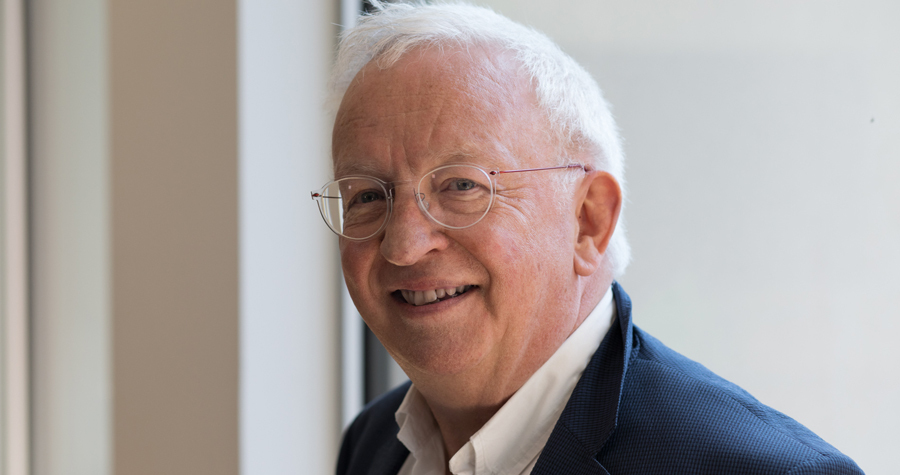
A Lutheran explorer...
Compositional influence
For as much as the Edward Gregson looks affectionately back to employ compositional variants (from the constructive framework of ‘Variations on Laudate Dominun’ to the autobiographical quotations from ‘Essay’ to ‘Of Distant Memories’ and more), he also very pointedly (conductors will do well to digest his extensive score notes) addresses present and future performance and interpretation concerns.
His is perhaps the foremost arc of compositional influence for the medium - one that he has helped to broaden exponentially
And why not?
His is perhaps the foremost arc of compositional influence for the medium - one that he has helped to broaden exponentially with his clearly defined style of writing that intuitively embraces command of tonality, vibrancy and texture as well as dynamics, pacing and colouring.
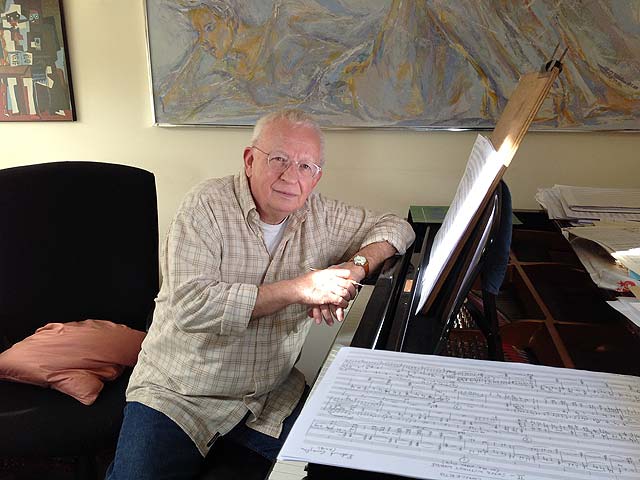
An expert weaver of musical cloth
Forensic analysis
The subtlest nuances of the musical weave of ‘The World Rejoicing’ are only fully revealed with a forensic appreciation of the composer’s wishes.
As he says: “There are many opportunities in a performance of this work to exploit the full range of colours and sonorities from a brass band” - from “homogeneously blended ensemble” to a “symphonic brass section”, playing ‘through’ notes “without decay and with minimum vibrato”.
Rejoice then by all means, but don’t try and do it by ignoring the basic premise of what you are rejoicing about.
Misplaced
And whilst he also asks bands to demonstrate “the virtuosic side of brass playing” to “sound both majestic and triumphant”, there is also a polite forcefulness in his insistence that conductors not to ‘over-indulge’ and to follow tempi indications closely – all the way through to a tempo giusto ending for those wishing to handbrake a misplaced glacial apotheosis.
Rejoice then by all means, but don’t try and do it by ignoring the basic premise of what you are rejoicing about.
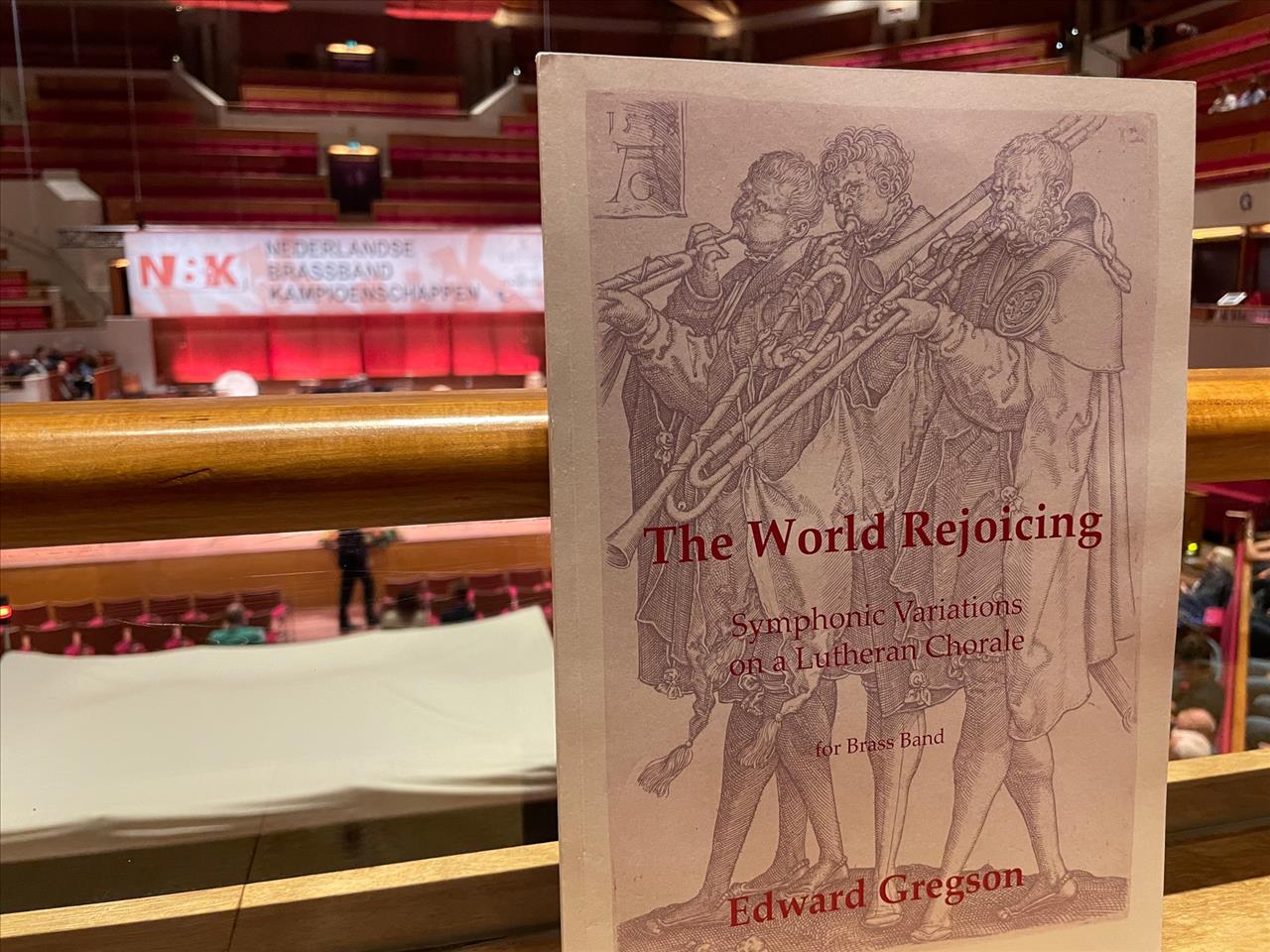
The work received its world premiere in The Netherlands
American quilt
The composer does this himself throughout the score - referencing his own music in the manner of Strauss’s ‘Ein Heldenleben’ (as he says), so that there is a familiarity to each of the sub-divisions of the work’s symphonic development; the opening ‘Prelude’ followed by a ‘Capriccio’, ‘La Danza 1’, ‘Processional’, ‘La Danza 2’, ‘Arias & Duets’, ‘Fuga Burlesca’, ‘Chorale’ and ‘Postlude’.
It's like unfurling one of those wonderful handmade American quilts; with nine patterned panels expertly woven with bold colour threads and intricate stitching, elegantly laced with finely judged percussion and precision ensemble writing.
It's like unfurling one of those wonderful handmade American quilts; with nine patterned panels expertly woven with bold colour threads and intricate stitching, elegantly laced with finely judged percussion and precision ensemble writing.
Each provides a telling section that echoes former designs and influences pinned in place by a simple piece of 1636 Lutheran chorale cloth. It’s an artistic construct the likes of Bach and Mendelssohn have cut a piece from in the past.
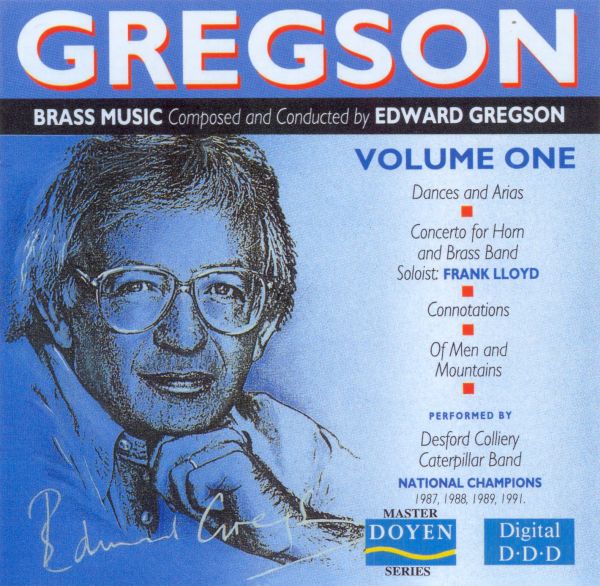
The work has its autobiographical musical links
Fits snugly
Everything fits snugly in its right place (nothing stuck on like a garish designer logo), crafted with a tog value generosity of spirit that could keep a pensioner warm in a freezer this winter.
Everything fits snugly in its right place (nothing stuck on like a garish designer logo), crafted with a tog value generosity of spirit that could keep a pensioner warm in a freezer this winter.
As a result there is more than enough room for conductors to find the right musical niche throughout its compact 16 minute duration, although approached with blunt-minded intellect (and perhaps the reason why Gregson is so politely insistent) the music can be reduced to a series of patchwork vignettes.
Excellent analysis
In his excellent analysis written for Brass Band World magazine, Paul Hindmarsh explored all these aspects with an acute understanding for detail as well as duvet sized covering. It is well worth checking out.
‘The World Rejoicing’ is dedicated to Bramwell Gregson (the composer’s late brother) who conducted the first performances of ‘Laudate Dominum’ by the London Citadel Band of the Salvation Army (Ontario) on their 1976 tour to the UK.
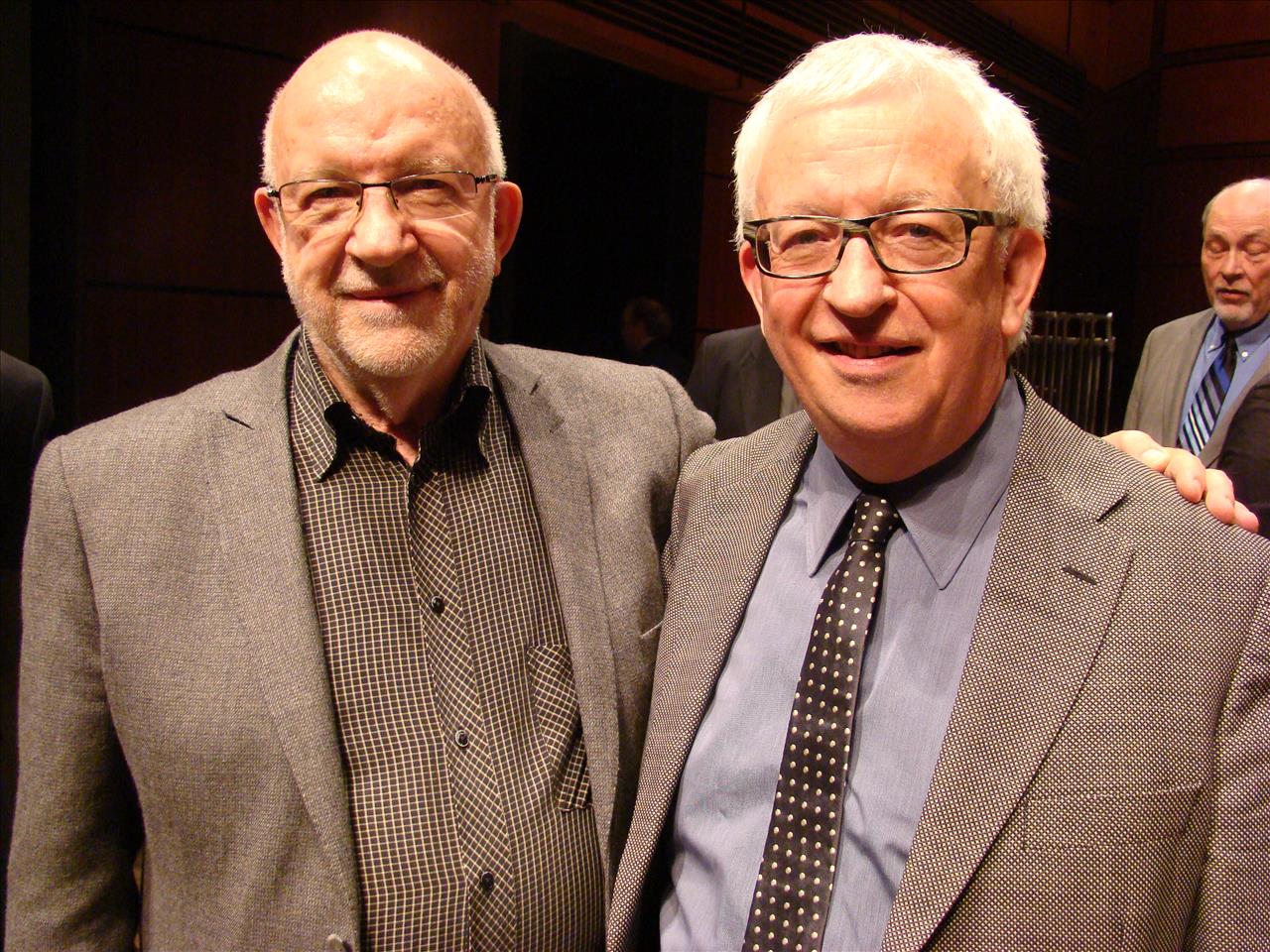
Dedicated to a brother in arms: Bram and Eddie
Mature appreciation
The tongue in cheek riposte Gregson gave in an interview that the work was “like Variations on Laudate Dominum for grown-ups” is however a witty piece of self-deprecation - nothing more. All his works reward mature appreciation.
That was seen in the analysis that followed - the question of compositional ‘distance’ explored from the opening tributary trombone solo, which is soon joined in flow by lines from horn and vibraphone that settle in a bitonal chord that sinks its bold stanchions into the foundations of the score.
It in turn leads into the lyrical heart of the work - a molto espressivo ‘Arias & Duets’ that crucially, according to the composer’s wishes, must still maintain a sense of flow and motion.
It is followed by a light and decisive ‘Capriccio’, full of razor sharp detailing and the first of the homage quotes that ends neatly on another from the repiano cornet. The first of the ‘La Danzas’ is also full of rhythmic vitality, its links more opaque yet played with a direct symphonic polish to the tonality.
Noble tread
The ’Processional’ that follows has a noble tread – never maudlin or sentimental – a passing of autumnal colourings rather than a deathly Monkish cortege, whilst the second ‘dance’ is paced exactly as the first, underpinned by running quaver passages and decisive chordal thumps.
It in turn leads into the lyrical heart of the work - a molto espressivo ‘Arias & Duets’ that crucially, according to the composer’s wishes, must still maintain a sense of flow and motion.
These are the intertwined tributary lines flowing with eloquent lyricism; the horn, baritone, trombones, flugel, cornet and euph all under a spotlight that casts a shadow response of ‘distant memories’ before a mist of tranquility descends for an impassioned climax to emerge.
Beautifully elaborate
As Paul Hindmarsh says, these are a series of “beautifully elaborate arias and duets”, some of the “most elegantly composed passages in Gregson’s music – generous in expression and full of nuanced detail.” He is not wrong.
Even in these troubled times, Edward Gregson has given us a work for both performers and listeners alike to ‘rejoice’ in.
What follows is a free flowing ‘Fuga Burlesca’ – waspish and impetuous, yet rhythmically controlled with its triplet intensity and precision that builds momentum to a glorious ‘Chorale’, majestic and triumphant.
The fascinating ‘Postlude’ is a last intellectual challenge in need of the most careful appreciation of pacing to work effectively and joyfully, rather than sound a bluster of misplaced artificial bombast.
Even in these troubled times, Edward Gregson has given us a work for both performers and listeners alike to ‘rejoice’ in.
Hopefully it will not be his ‘swan song’ as he hints in the score – but a herald call of joy that will echo across the banding world from Symphony Hall.
Iwan Fox



